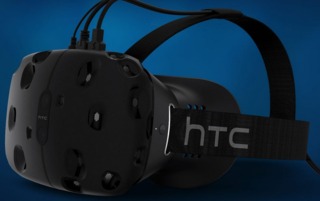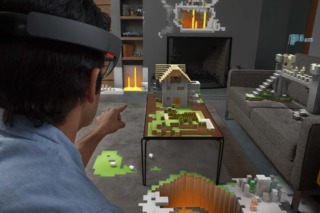Ex-Gears of War Boss Doubts VR's Mainstream Appeal
"I hope it happens but I think it's going to be a while," Mike Capps says.

Mike Capps, former president of Gears of War creator Epic Games, is skeptical about virtual reality reaching a wide audience. He says in a new interview that, regardless of how exciting technology like Oculus Rift and Vive might be, there are still major hurdles to overcome.

Speaking with GamesIndustry International, Capps said pricing could be an issue. He also said that, if people didn't want to wear 3D glasses at home, they might not want to be bothered with a full virtual reality headset.
"There's so little tolerance at the consumer level for that kind of an investment," he said. "And I think one of the things I'm most curious about--you look at 3D TV as a super easy-to-use technology that is really unfettered. Just a pair of polarized glasses and people didn't use it because it wasn't worth the trouble."
"The content difference was there. 3D Avatar looks way better than non-3D Avatar... If slipping on a pair of flicker glasses is too much trouble--then the idea of, 'OK, I'm going to put on my head mount rig and fire up my liquid-cooled PC in order to make it happen' [isn't likely to take off]. I hope it happens but I think it's going to be a while before my mom does that."
For any platform, content is key. Capps also said he foresees a potential problem with getting developers on-board to create virtual reality games.
"Last year when Oculus was visiting developers and saying, 'You should develop a game for our platform,' they were also saying, 'But we don't know when it's coming out and we don't know how many people are going to buy it.' And that's a really hard story as a developer," he explained.
This is often the case with new platforms, Capps said. But the difference is, when a company like Microsoft first pitched Epic on the Xbox console, they had a ship date in mind and a marketing budget for the console. With virtual reality platforms, however, that hasn't always been the case, he explained.
Another potentially problematic part of virtual reality, Capps said, is the potential for motion sickness to sour the public's opinion of the technology overall. If the virtual reality market is to succeed, headsets must keep users from losing their lunch. If reports emerge that virtual reality headsets are causing nausea left and right, the market could die.

"So please, gosh, guys, don't screw it up. Take all the time you need," Capps stressed.
For its part, Oculus VR's John Carmack said earlier this month that virtual reality motion sickness is a "real issue," but not as big a problem as previously thought. Valve, on the other hand, says it has cracked virtual reality's motion sickness problem, claiming that "zero percent of people get motion sick" when using the company's headset, Vive.
While Capps wasn't overly enthusiastic about virtual reality, he did talk more positively about augmented reality technology such as Microsoft's HoloLens. With this technology, you don't need to block the whole world out, and that has a certain appeal, he said.
"Just the fact that I could be using that in the room with my kids and my kids could be playing with their toys... I could be keeping an eye on them while I'm playing, like I do when I'm on an Xbox, like I do when I'm on my iPhone, but if I slap a headset on, I'm no longer dad," Capps explaned. "So there's a huge number of use cases where people cannot afford to shut out the world even though it's a wonderful way to maximize your entertainment experience."
Capps isn't the first to bring up this point. Electronic Arts founder Trip Hawkins said last summer that virtual reality technology not only causes practical issues in the living room, but it might make people feel alienated or isolated. Strauss Zelnick, the CEO of Grand Theft Auto parent publisher Take-Two Interactive, said last year that virtual reality overall may face issues reaching an audience outside of core gamers as it battles "anti-social" connotations.
There are now three major players in the virtual reality market: Oculus Rift, PlayStation's Project Morpheus, and Vive. Vive is due to launch this year for consumers, while Morpheus is releasing in 2016. All we know about the Oculus Rift consumer model is that it probably won't debut this year. In all cases, pricing has not been announced, though we know Vive won't be cheap.
Capps stepped down from his role as president of Epic Games in December 2012, before officially parting ways with the company in March 2013. He now serves on the board of directors for the Academy of Interactive Arts and Sciences, the Game Developers Conference, Remedy Entertainment, and Sphero.
Got a news tip or want to contact us directly? Email news@gamespot.com
Join the conversation